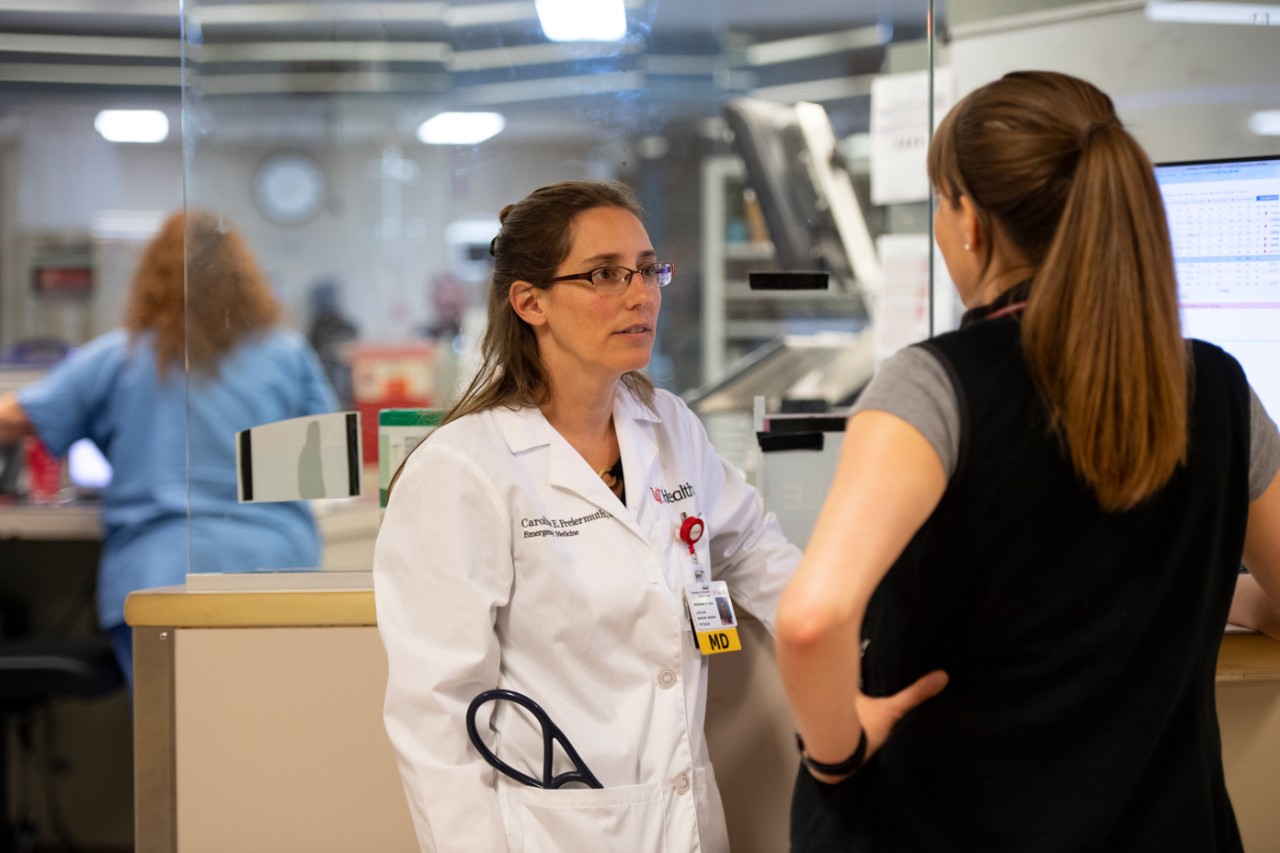
WVXU: Genetics play a role in opioid addiction. A UC doctor is drilling down on the specifics
Research could lead to the creation of a test for opioid use disorder
Since 2014, Ohio is in the top five nationwide in opioid deaths. Recently published research from the University of Cincinnati examines the role of genetics in opioid use disorder. WVXU produced a story on the research, interviewing lead researcher, Caroline Freiermuth, MD, of the Department of Emergency Medicine at the UC College of Medicine. She and her team screened over 1,300 patients at three Ohio urban emergency rooms and found 20% had opioid use disorder.
The patients studied were at the ER for a variety of reasons. Some were already addicted to opioids, some had never taken them, and others were using them to manage acute pain. All of them were asked to be part of the study.
WVXU reported the 20% of people who had opioid use disorder is higher than what was previously thought — 2% in the general population and 7-15% in emergency room settings.
"This is still a hidden disease," Freiermuth says. "People are afraid to talk about it and we really do need to do a better job of screening so that we can identify the people who have already developed this disorder and really get them into the treatment they need."
For genetics, she looked at the dopamine reward pathway and the metabolism of opioids for the study.
Using artificial intelligence, her team is analyzing the entire data set, including things like the environment, mental health disorders, and past experiences to see what role they play.
"The biggest takeaway is this adds to the body of research that says there is really a genetic component," Freiermuth says. "We're starting to hone down what the genetic component is and we could get to a point in the future when we could run tests and if you have opioid use disorder, we could run the test on you and we could run it on your children so that we could counsel people in the future that they may also be at risk."
Read more about the research here.
Lead photo of Caroline Freiermuth, MD/Colleen Kelley/UC Marketing + Brand
Next Lives Here
The University of Cincinnati is classified as a Research 1 institution by the Carnegie Commission and is ranked in the National Science Foundation's Top-35 public research universities. UC's graduate students and faculty investigate problems and innovate solutions with real-world impact. Next Lives Here.
Related Stories
2021 University Recognition Ceremony honors student achievements
April 13, 2021
The University of Cincinnati recognizes students each year who have made significant service, leadership, and academic contributions to the UC community. These students exemplify the spirit of what it means to be a Bearcat.
UC Day of Giving a success
April 28, 2021
University of Cincinnati Day of Giving’s 24-hour challenge was a tremendous success this year, raising $2,219,197 with 3,232 gifts. The fourth annual UC Day of Giving raised its most money to date with alumni, donors, students, faculty and staff joining together to support UC and UC Health.
President picks exceptional talent
April 28, 2021
The University of Cincinnati 2021 Presidential Leadership Medal of Excellence Awards honor six undergraduate scholars for scholarship, leadership, character, service and the ideals of the university. Awardees are spotlighted for exceptional academics, creativity, community service and innovation.
Grad students earn president's highest honor
April 28, 2021
The University of Cincinnati 2021 Presidential Medal of Graduate Student Excellence Awards honor three graduate scholars for scholarship, leadership, character, service and the ideals of the university. Awardees are spotlighted for exceptional academics, creativity, community service and innovation.
GIVEHOPE and BSI Engineering Celebrate Ten Years of Driving Research
August 3, 2021
Years after two personal losses from pancreatic cancer, Cincinnati-based nonprofit GIVEHOPE and consulting firm BSI Engineering are celebrating a philanthropic partnership that has funded 13 pilot research projects at the University of Cincinnati Cancer Center.
Finding community and building a future
July 9, 2021
As a University of Cincinnati College of Medicine student, Sarah Appeadu, MD, ’21, remembers journaling on the “3 Cs” that got her through medical school: Community, community, community. Now, when she lists the people who supported her through four years of training—the last year in a global pandemic—it keeps growing: her family, her church, her classmates, and the college’s Office of Student Affairs and Office of Diversity, Equity and Inclusion. “I look back and it was such a crucial time to really be nurtured in that way,” she says. “I’m so thankful that I had those people. It shows being around the right people really mattered. That’s my same hope for residency even.”
New York Times: Flint Weighs Scope of Harm to Children Caused by Lead in Water
February 1, 2016
Kim Dietrich, a professor of environmental health at UC's College of Medicine, is quoted in this story on the medical problems that could develop among the thousands of young children exposed to lead-contaminated water in Flint, Mich.
Cancer-Causing Gene Found in Plasma May Help Predict Outcomes for Patients
February 18, 2016
Researchers at the University of Cincinnati have discovered that a human cancer-causing gene, called DEK, can be detected in the plasma of head and neck cancer patients.
UC Receives $1.9 Million to Study Pain
February 15, 2016
Jun-Ming Zhang, MD, of the UC College of Medicine, is the principal investigator of a $1.95 million grant to study the interacting roles of the sympathetic and sensory nervous and immune systems in back and neuropathic pain models.
MD Magazine: Generic Drug Equally Effective in Epilespy
February 22, 2016
Michael Privitera, MD, a professor of neurology at UC's College of Medicine and director of the Epilepsy Center at the UC Neuroscience Institute, is featured in this story about research he led that examined the efficacy of generic drug substitution for epilepsy.
